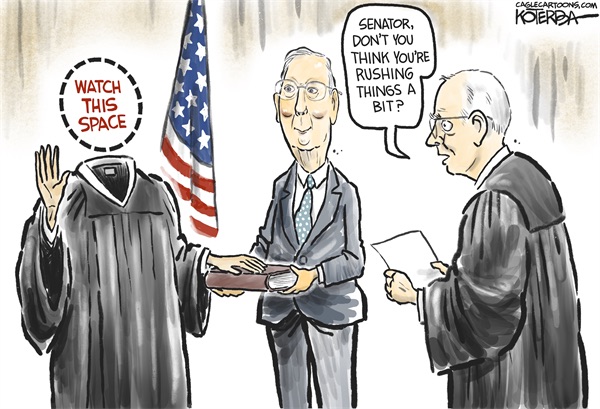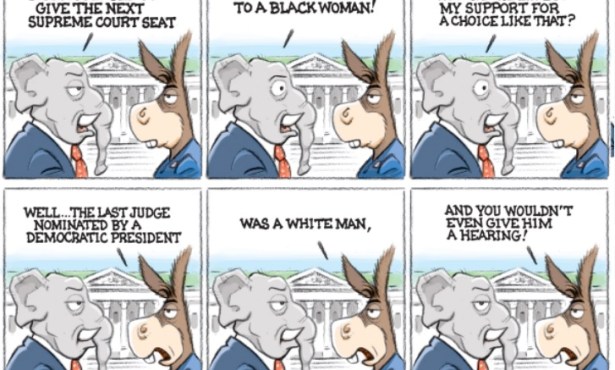Save the Supreme Court
How to Preserve a Fair Hearing for the Next Justice

Ruth Bader Ginsburg’s passing was a tragedy of unmatched proportion. She was a legal giant and a tireless advocate for justice. Her work for gender equality was ground breaking, writing in U.S. v. Virginia (1996): “Generalizations about the way women are … no longer justify denying opportunity to women… .”
Sadly, the battle for her replacement began just hours after her passing.
It’s not surprising that the Republicans are rushing to replace her less than two months before the election, with early voting underway. The stakes are enormous. They involve overturning Roe v. Wade and a woman’s right to choose, and the repeal of the Affordable Care Act (ACA) and the reinstating of pre-existing conditions as an excuse for insurance companies to deny health care.
Trump’s preferred nominees are anti-abortion, and his administration is now before the Supreme Court arguing that the ACA should be repealed in its entirety, even though they have offered no alternative to it.
There are things that can be done about this, both before and after the election.
Before the election. Mitch McConnell has said “there will be a vote in the Senate” this year. He did not specify before the election. This is because he only has a four-vote majority (53-47, Vice President Pence would break a tie) in the Senate, with more than four Republicans in tight races.
Historically, Supreme Court nominations take at least two months to navigate the confirmation process. A pre-election vote would deprive his members of the time they need to campaign to keep their seats and maintain Republican control of the Senate. In other words, vulnerable Republicans can still be forced to commit to opposing a vote before the election.
Two Republicans, Susan Collins of Maine and Lisa Murkowski of Alaska, are on record saying they will not vote on a nominee before the election; that leaves two more. While Cory Gardner (R-CO) has committed to supporting Trump’s nominee, there are still other vulnerable Republicans who should be pressured. These include Thom Tillis (R-NC), Steve Daines (R-MT), David Perdue (R-GA), Kelly Loeffler (R-GA), and Joni Ernst (R-IA). Constituents should flood their offices with phone calls, emails, and letters. Non-constituents should support their opponents with donations, by writing postcards and letters, and phone banking.
In addition, Jamie Harrison, running against Lindsey Graham in South Carolina, and Amy McGrath, running against Mitch McConnell in Kentucky, should be supported — not just because these are close races, but because of McConnell and Graham’s hypocrisy in reversing their positions on Supreme Court votes during an election year.
The context for this strategy requires Biden/Harris and the Democratic party to every day remind voters what’s at stake, and that in 2016 McConnell and the Republicans established a precedent of not voting on a Supreme Court nominees during a presidential election year; arguing that the voters should decide who makes the nomination. Nine months (270 days) before the election, McConnell refused to give President Obama’s nominee, Merrick Garland, a hearing.
Senate Democrats should do everything they can procedurally to slow down or stop the work of the Senate, reminding voters of why they are doing it.
After the election. Realistically, the vote on Trump’s nominee will probably come after the election, during the lame duck session (between the November election and January 3, when a new Congress forms). Assuming Biden wins, and/or the Democrats take control of the Senate, this part of the strategy requires an outcry so loud, it cannot be denied. Mindful of the COVID threat, I believe it would take massive protests to move lame duck Republicans.
The Heritage Foundation is a prestigious conservative think tank. Its mission is to “promote conservative public policies.” Its website states, “Donald Trump and many Republican Congressman promised they’d drain the swamp. And Heritage is here to help them do just that.”
Heritage’s position on lame duck sessions is “Congress should not consider any major legislation or presidential nominations during a so-called lame-duck session. Doing so undermines representative government by weakening the accountability link between the American people and their elected representatives.”
While this kind of rationale will not sway Trump or McConnell, even if they have been voted out of office, it has the potential to convince those Republicans looking at political life for themselves and their party after Trumpism.
If we are going to honor RBG’s dying wish, that her replacement not be appointed prior to a new president, this is what has to happen.



